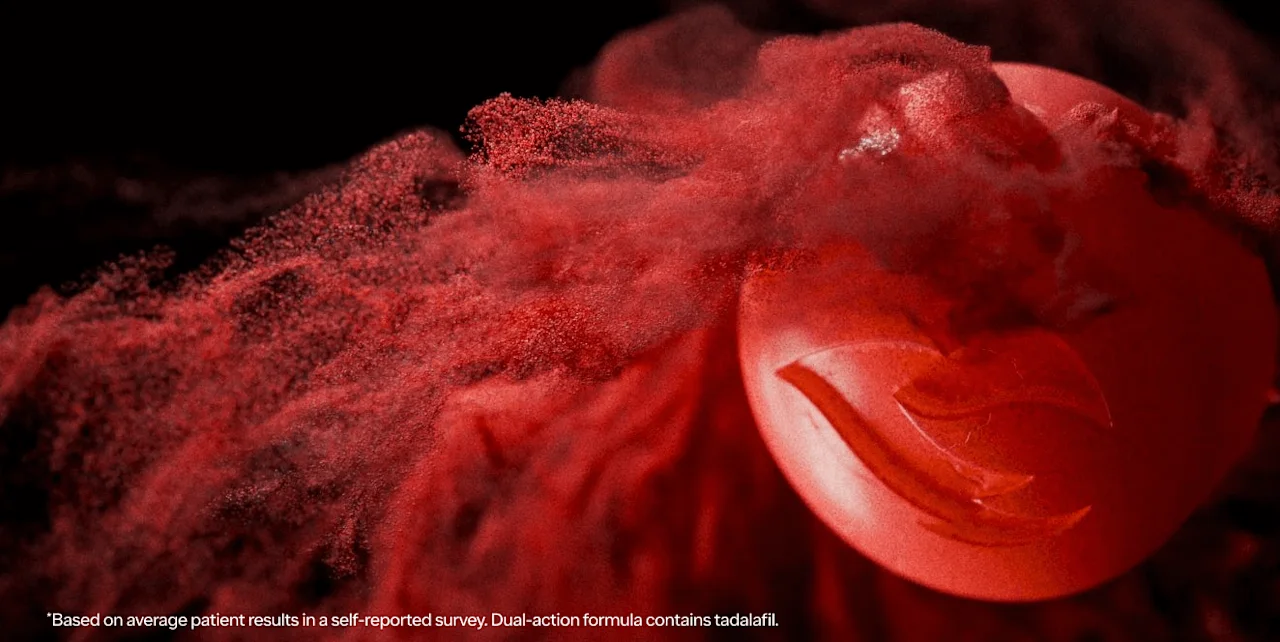Key takeaways
Some studies show that apomorphine might be effective for erectile dysfunction (ED), though more evidence is needed.
Keep in mind that apomorphine is not FDA-approved for ED; it's only approved for Parkinson's disease.
Other treatments like Viagra or Cialis are FDA-approved and have stronger evidence that they can treat ED more effectively.
Here's what we'll cover
Here's what we'll cover
Here's what we'll cover
Key takeaways
Some studies show that apomorphine might be effective for erectile dysfunction (ED), though more evidence is needed.
Keep in mind that apomorphine is not FDA-approved for ED; it's only approved for Parkinson's disease.
Other treatments like Viagra or Cialis are FDA-approved and have stronger evidence that they can treat ED more effectively.
If you’re scouring the internet for alternatives to common erectile dysfunction (ED) treatment options, you may have read about apomorphine for ED. Apomorphine is a medication used to treat symptoms of Parkinson’s disease. But can it also help ED?
Keep reading to find out the answer and more.
Apomorphine for ED at a glance
What is it? Apomorphine is a prescription medicine that mimics the effects of dopamine and is approved by the US Food and Drug Administration (FDA) to treat Parkinson’s disease.
How does it work for ED?
Apomorphine activates dopamine receptors, helping kick-start the signals that lead to an erection.
It can have varying effectiveness in treating ED.
One systematic review found apomorphine might work best in low doses and in men with mild-to-moderate ED (as opposed to more severe forms).
Is it FDA-approved for ED? No, it's only approved for Parkinson's disease
Should you take apomorphine? It depends. Apomorphine could be an option if you can’t take PDE-5 inhibitors, like Viagra or Cialis, or don’t respond well to them. It may also help with psychogenic ED, since it works on the brain pathways involved in sexual arousal.
What is apomorphine?
Apomorphine is a prescription medication known as a dopamine agonist. This means it mimics the brain chemical dopamine, but it does not reliably create a feel-good dopamine hit. Besides working on the reward pathways, apomorphine also affects movement-related circuits.
It’s mainly used to treat Parkinson's disease (PD), a progressive brain condition that affects movement. Apomorphine is typically given as an injection under the skin. It also used to come in a dissolvable form under the tongue, though this version is no longer available in the U.S.
How does apomorphine work for ED?
Unlike other ED medications that work on blood vessels in the penis (e.g Viagra, Cialis), apomorphine works on the brain, specifically in sexual arousal.
Here’s a closer look at how apomorphine can work for ED:
Apomorphine binds to and activates dopamine receptors in the brain that are involved in sexual arousal.
Once these receptors are activated, they help start the brain signals that lead to an erection.
This happens because the brain sends messages through the nervous system to the body.
These signals travel down the spinal cord and activate the nerves that control blood flow to the penis.
This brain-to-body connection helps trigger an erection, even though the medication doesn’t act directly on the penis itself.
Because of the way it works, apomorphine doesn’t help with issues related to blood flow or blood vessel health, which are among the leading causes of ED. Apomorphine may be more suitable if your ED issues are more psychological rather than due to a physical health condition.
Apomorphine has varying effectiveness among people, so you may or may not find it helpful for ED, and it could be associated with side effects. Still, it’s worth a conversation with your healthcare provider if other ED medications aren’t working or aren’t a good fit.
Is apomorphine for ED effective?
In a word: Possibly. Apomorphine may have some effectiveness for ED, but there are better treatment options out there.
A meta-analysis concluded that under-the-tongue (sublingual) apomorphine could be safe and effective for improving erectile function in certain people when taken at low doses of 2–3 mg. But the medication didn’t work any better than a placebo in people with diabetes or who have had prostate removal surgery. (Both of which can be true in people with ED.)
Simply put, apomorphine isn’t a popular treatment option for ED because it just isn’t very effective. It’s not mentioned in ED treatment guidelines from experts at the American Urological Association. And the FDA denied approval of apomorphine for ED in 2003.
We also know that apomorphine doesn’t work as well as phosphodiesterase type 5 (PDE5) inhibitors for ED. A 2008 study found that sildenafil (Viagra) — a type of PDE5 inhibitor— works better than sublingual apomorphine for getting an erection and feeling satisfied.
But sublingual apomorphine hasn't been available in the US since 2023. And unfortunately, there’s little to no research on apomorphine injections for ED. Only the sublingual form of the drug has been studied for ED.
Is apomorphine for ED safe?
The injectable form of apomorphine has been considered safe and effective for the treatment of Parkinson’s disease, but it’s not approved by the FDA to treat ED.
Talk to a healthcare provider about your situation and whether apomorphine may be an option for you.
Side effects
Apomorphine can cause side effects, including:
Yawning
Drowsiness
Runny nose
Nausea
Vomiting
Swelling
Involuntary muscle movements, known as dyskinesia
Serious side effects can include:
Low blood pressure
Fainting
Confusion
Prolonged painful erections (priapism), though this is quite rare
Fast heartbeat
Heart rhythm problems
Hallucinations
Keep in mind that side effect data for apomorphine injections are based on the medications’ use (and dosage) for Parkinson’s disease.
Interactions
Apomorphine likely isn’t a safe option if you have certain conditions, such as low blood pressure or cardiovascular problems. It may not be safe for people taking certain medications, such as:
Medications to manage high blood pressure (antihypertensives)
Medications that relax and widen blood vessels (vasodilators)
Other dopamine antagonists, such as neuroleptics or metoclopramide
Certain antiemetics (anti-nausea), such as ondansetron (Zofran)
This list is not comprehensive. Speak to your healthcare provider if you have specific concerns.
Who is apomorphine for ED best for?
Apomorphine for ED may not be a fit for everyone, but it may be worth considering if:
The more common options (like PDE5 inhibitors such as Viagra or Cialis) don’t work for you
You can’t take a PDE5 inhibitor because of a contraindication, like an allergy or a medication interaction (for example, taking nitrates)
Your ED isn’t severe, since studies show apomorphine tends to be most effective in mild to moderate cases
Your ED is driven more by psychological factors (like stress or anxiety) rather than a blood-flow problem
You’re not in an age group where apomorphine carries higher risks (it hasn’t been well-studied in adults over 65, and side effects can be more severe).
Keep in mind that apomorphine isn’t FDA-approved for ED and isn’t considered a first-line treatment by any means. There are numerous options for ED treatment. Speak with your healthcare provider to figure out what’s best for you.
Should I take apomorphine for ED?
If your ED is mild and you have health conditions that prevent you from taking PDE-5 inhibitors, you might want to discuss apomorphine with your healthcare provider.
While apomorphine is neither FDA-approved nor a first-line choice for treating ED, it has shown some effectiveness in milder cases compared to placebo. If other medication options aren’t a fit for you, it could be worth bringing up at your next visit.
Of course, apomorphine isn’t your only option — other treatments, such as injectable medications (like alprostadil), vacuum erection devices, and lifestyle or mental health approaches, may also be effective depending on what’s causing your ED.
3 alternatives to apomorphine for ED
According to current research, it’s hard to confidently say whether apomorphine can be effective in treating ED.
But some good news: There are plenty of other options that have been proven to be safe and reliable, from PDE5 inhibitors to lifestyle changes.
Other prescription medications
Largely considered first-line treatment for ED, PDE5 inhibitors are FDA-approved oral medications that work in part by increasing blood flow to the penis. These medications can help give you stronger, longer-lasting erections when you experience arousal.
Common PDE5 inhibitors, all of which require an Rx from a healthcare provider, include:
Viagra (sildenafil)
Cialis (tadalafil)
Vardenafil (previously available as brand name Levitra)
Stendra (avanafil)
Can’t take pills? Or simply not a fan of doing so? Consider these other formulations:
Ro Sparks, a sublingual, fast-acting treatment containing both sildenafil and tadalafil (the active ingredients in Viagra and Cialis).
Daily Rise Gummies, fruit-flavored gummies that contain tadalafil and are designed for daily use, so you can be ready ‘round the clock.
While they have not been specifically FDA-approved for the treatment of ED, their active ingredients have been individually FDA-approved for ED treatment.
Lifestyle changes
Certain lifestyle modifications can also help reduce ED symptoms and improve sexual function. These include:
Exercising regularly. Physical activity brings a lot of heart-health benefits to maintain healthy blood pressure and circulation. Both of these are essential for getting and keeping an erection.
Eating a healthy, balanced diet. A nutritious eating pattern can help lower risk factors for ED, including type 2 diabetes, high blood pressure, and obesity. This involves a balanced diet with plenty of fruits, vegetables, whole grains, and lean proteins. Try to limit processed foods, excess sodium, and added sugars.
Getting enough sleep. Consistently getting six or fewer hours of sleep per night can increase the risk of ED. Not to mention, poor sleep can contribute to obesity, high blood pressure, heart disease, and type 2 diabetes — conditions that negatively impact the health of your blood vessels and boost the chances of developing ED. Aim for 7-9 hours of quality sleep each night by improving your sleep habits and going to bed earlier.
Take care of your mental health
Stress and mental health issues such as anxiety and depression can disrupt sexual function. Practicing stress management techniques can reduce your risk of ED. You may want to try:
Deep breathing
Mindfulness practices
If these strategies aren’t sufficient, or if you need additional support, consider consulting a therapist or mental health professional.
Bottom line
Apomorphine is a dopamine agonist that’s FDA-approved to treat Parkinson’s disease. While apomorphine has been explored as a potential treatment for ED, its effectiveness is limited, and it is not FDA-approved for ED at this time.
Apomorphine comes in two forms: a subcutaneous (under-the-skin) injection and a sublingual tablet. However, the form that’s been researched as a potential treatment for ED (sublingual) is not available in the US.
There is some evidence that low doses of the injectable form of apomorphine may help men with mild-to-moderate ED. This is especially true when the cause of their condition is more psychological than blood-flow related.
As with any medication, apomorphine can come with side effects. These include nausea, falling asleep during the day, and headache. More severe side effects are also possible and can include heart problems and hallucinations.
More effective options exist, such as PDE5 inhibitors (which are actually FDA-approved for the treatment of ED!). You may also want to explore lifestyle changes that can support your sexual health.
If you’re seeking treatment for ED, your best course of action is to consult a healthcare provider. They can help you go over your options as well as get to the root cause of ED, so you can be effectively treated.
Frequently asked questions (FAQs)
How does apomorphine compare to Viagra?
Apomorphine isn’t as effective as Viagra, nor is it as well-studied. There is some research showing apomorphine can be effective in small doses and in milder forms of ED. The two medications also work in different ways: While Viagra boosts blood flow, apomorphine affects the brain's role in getting an erection.
Can I take apomorphine with Viagra?
No, you shouldn’t take apomorphine and Viagra together. Viagra works to dilate your blood vessels so more blood can flow to the penis. According to prescribing information, apomorphine and Viagra can both cause low blood pressure. Taking the two together could cause a dangerous drop in blood pressure. Never combine medications unless expressly told to do so by a healthcare provider.
What does apomorphine feel like?
Because apomorphine is a dopamine agonist, it works on the brain circuits involved in sexual arousal. While you may have heard of dopamine before, apomorphine may not necessarily create a strong mood boost. It helps initiate the signals that lead to an erection, but it doesn’t consistently increase sexual desire or produce a noticeable “feel-good” effect.
What is the absolute best treatment for ED?
There isn’t any one best treatment for ED. The best treatment for you is the one that addresses the underlying cause of your ED. If your problem is related to blood flow to the penis, apomorphine isn’t typically effective. PDE5 inhibitors like Viagra and Cialis have been extensively studied for their use in treating ED. But lifestyle changes and mental health support can also help improve sexual function.
Can a 70-year-old man take apomorphine?
There are other medications that are safer for older adults to take than apomorphine. According to the prescribing information, apomorphine hasn’t been as well-studied in people over age 65 compared to people under age 65. Older adults could be prone to more serious side effects of the medication, such as low blood pressure, fainting, and hallucinations. Before taking any medication, discuss the risks and benefits with your healthcare provider.
DISCLAIMER
If you have any medical questions or concerns, please talk to your healthcare provider. The articles on Health Guide are underpinned by peer-reviewed research and information drawn from medical societies and governmental agencies. However, they are not a substitute for professional medical advice, diagnosis, or treatment.
Viagra Important Safety Information: Read more about serious warnings and safety info.
Cialis Important Safety Information: Read more about serious warnings and safety info.
References
Afif-Abdo, J., Teloken, C., Damião, R., et al. (2008). Comparative cross-over study of sildenafil and apomorphine for treating erectile dysfunction. BJU International, 102(7), 829–834. doi: 10.1111/j.1464-410X.2008.07767.x. Retrieved from https://pubmed.ncbi.nlm.nih.gov/18537952/
American Urological Association. (n.d.). Erectile dysfunction treatment guidelines. Urology Care Foundation. Retrieved from https://www.auanet.org/guidelines-and-quality/guidelines/erectile-dysfunction-(ed)-guideline
Boileau, I. & Warsh, J. J. (2022). Apomorphine in the treatment of erectile dysfunction: A critical review. Journal of Urology, 208(4), 674–681. doi: 10.1097/JU.0000000000003015. Retrieved from https://www.ncbi.nlm.nih.gov/pmc/articles/PMC9621223/
Choi, J. & Horner, K. A. (2023). Dopamine Agonists. StatPearls. Retrieved from https://www.ncbi.nlm.nih.gov/books/NBK551686/
Chou, K. L. (2020). Apomorphine. StatPearls. Retrieved from https://www.ncbi.nlm.nih.gov/books/NBK470193/
Duca, Y., Calogero, A. E., & Cannarella, R., et al. (2019). Erectile dysfunction, physical activity and physical exercise: Recommendations for clinical practice. Andrologia, 51(5), e13264. doi: 10.1111/and.13264. Retrieved from https://pubmed.ncbi.nlm.nih.gov/30873650/
Giovannoni, G. (2020). Pharmacokinetics and pharmacodynamics of apomorphine: Clinical implications. Journal of Clinical Movement Disorders, 7, 1–12. doi: 10.1186/s40734-020-00093-0. Retrieved from https://pubmed.ncbi.nlm.nih.gov/30873650/
Guillén, V., Rueda, J. R., Lopez-Argumedo, M., et al. (2020). Apomorphine for the treatment of erectile dysfunction: Systematic review and meta-analysis. Archives of Sexual Behavior, 49(8), 2963–2979. doi: 10.1007/s10508-020-01817-5. Retrieved from https://pubmed.ncbi.nlm.nih.gov/32964351/
Hauser, R. A. & Zesiewicz, T. A. (2018). Apomorphine for the treatment of Parkinson's disease. Journal of Parkinson's Disease, 8(4), 557–574. doi: 10.3233/JPD-181381. Retrieved from https://www.ncbi.nlm.nih.gov/pmc/articles/PMC6268166/
Jain, R. & Hauser, R. A. (2020). An overview of apomorphine: Mechanisms and clinical applications. CNS Drugs, 34(3), 235–250. doi: 10.1007/s40263-020-00700-8. Retrieved from https://pubmed.ncbi.nlm.nih.gov/32066450/
Mollaioli, D., Ciocca, G., & Limoncin, E., et al. (2020). Lifestyles and sexuality in men and women: the gender perspective in sexual medicine. Reproductive Biology and Endocrinology : RB&E, 18(1), 10. doi: 10.1186/s12958-019-0557-9. Retrieved from https://pubmed.ncbi.nlm.nih.gov/32066450/
Müller, T. (2022). Apomorphine. ScienceDirect Topics. Retrieved from https://www.sciencedirect.com/topics/medicine-and-dentistry/apomorphine
U.S. Food and Drug Administration (FDA). (2022). Highlights of Prescribing Information: APOKYN (apomorphine hydrochloride injection), for subcutaneous use. Retrieved from https://www.accessdata.fda.gov/drugsatfda_docs/label/2022/021264s022lbl.pdf
U.S. Food and Drug Administration (FDA). (2025). Highlights of Prescribing Information: ONAPGO (apomorphine hydrochloride) injection, for subcutaneous use. Retrieved from https://www.accessdata.fda.gov/drugsatfda_docs/label/2025/214056s000lbl.pdf
U.S. Food and Drug Administration (FDA). (2017). Highlights of Prescribing Information: VIAGRA (sildenafil citrate) tablets, for oral use. Retrieved from https://www.accessdata.fda.gov/drugsatfda_docs/label/2017/020895s048lbl.pdf
Zhang, F., Xiong, Y., & Qin, F., et al. (2022). Short Sleep Duration and Erectile Dysfunction: A Review of the Literature. Nature and Science of Sleep, 14, 1945. doi: 10.2147/NSS.S375571. Retrieved from https://pmc.ncbi.nlm.nih.gov/articles/PMC9621223/













